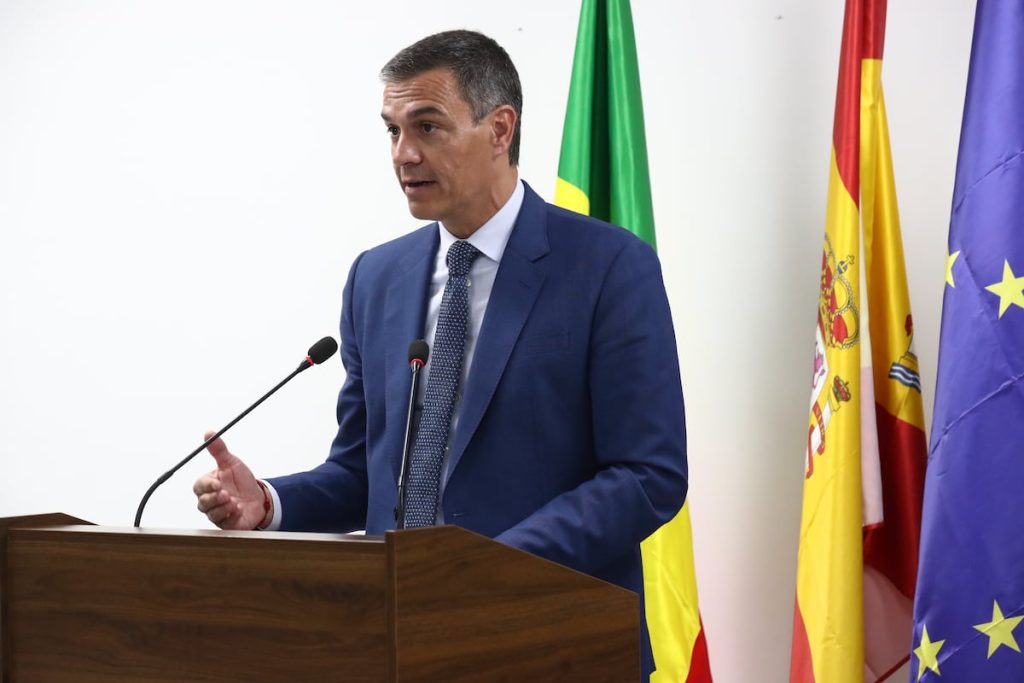In his recent public appearance during a tour of three West African countries, Pedro Sánchez sought to clarify the Spanish government’s position on immigration, which has been the subject of misinformation and attacks. Speaking alongside Senegalese President Bassirou Diomaye Faye in Dakar, Sánchez emphasized the distinction between orderly migration, which he described as “necessary and positive for both origin and destination countries,” and irregular migration, which he characterized as a dangerous path leading to exploitation, inequality, and a high risk of death for young migrants. He praised Senegal’s cooperation in managing migration flows and pledged to strengthen this partnership, highlighting the benefits of regular migration in countering criminal networks and xenophobia.
Sánchez did not directly link human trafficking networks with jihadist groups in this statement, as he had done earlier in his visit to the Instituto Cervantes in Dakar. Nor did he mention the controversial issue of repatriating irregular migrants to African countries, a sensitive topic for Senegalese authorities who have not agreed to such returns since taking office last spring. Instead, Sánchez focused on the positive outcomes of his tour, describing Mauritania, Gambia, and Senegal as “partners and friends” and outlining the objectives of his trip, which included acknowledging the efforts of these governments in curbing irregular migration, promoting economic development opportunities, enhancing security capacities, and offering alternatives to irregular migration through circular migration agreements.
Senegalese President Faye expressed gratitude for the reception of Senegalese residents in Spain and voiced concerns about mass departures of migrants from Senegalese shores, emphasizing the need to address root causes of migration by fostering development in origin countries and facilitating regular migration pathways. Despite Sánchez’s efforts to clarify his government’s approach to immigration, media reports have misconstrued his statements, leading to false claims that he had promised to regularize 250,000 immigrants in Mauritania. These inaccurate reports sparked accusations of creating an “attraction effect” for irregular migration and calls for accountability from opposition parties like the PP and Vox.
Government sources clarified that Sánchez’s reference to the necessity of returning irregular migrants to their countries of origin was not a response to criticism, but rather part of a comprehensive and humanitarian approach to immigration that prioritizes cooperation with origin and transit countries, circular migration opportunities, and combating human trafficking networks. The government denounced the opposition’s inflammatory rhetoric, accusing them of promoting hatred and discord rather than constructive solutions. Sánchez’s speech at the Instituto Cervantes was carefully crafted and did not reflect any last-minute changes in response to political pressure.
During the final leg of his trip, Sánchez engaged in a business breakfast with Spanish company executives in Senegal, highlighting economic cooperation opportunities and investments to support local development and youth employment. The multidimensional nature of Sánchez’s tour, which included commitments to high-level bilateral meetings, law enforcement cooperation against human trafficking, and economic initiatives to stimulate growth in partner countries, underscores Spain’s commitment to a holistic approach to migration management in collaboration with African nations. The signing of circular migration agreements in all three countries, focused on training and seasonal employment opportunities, reflects a proactive strategy to address labor market demands while promoting legal pathways for migrant workers.


